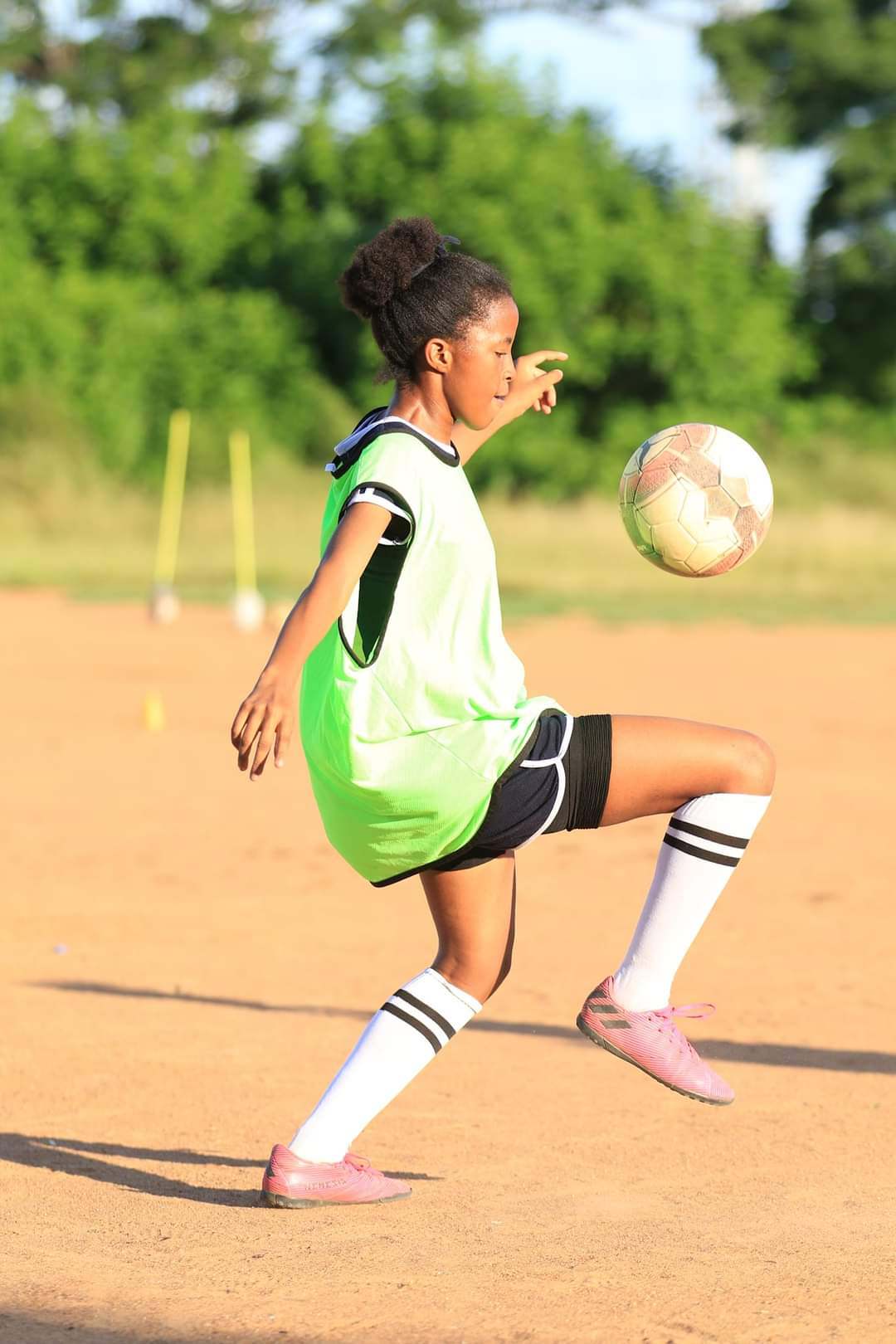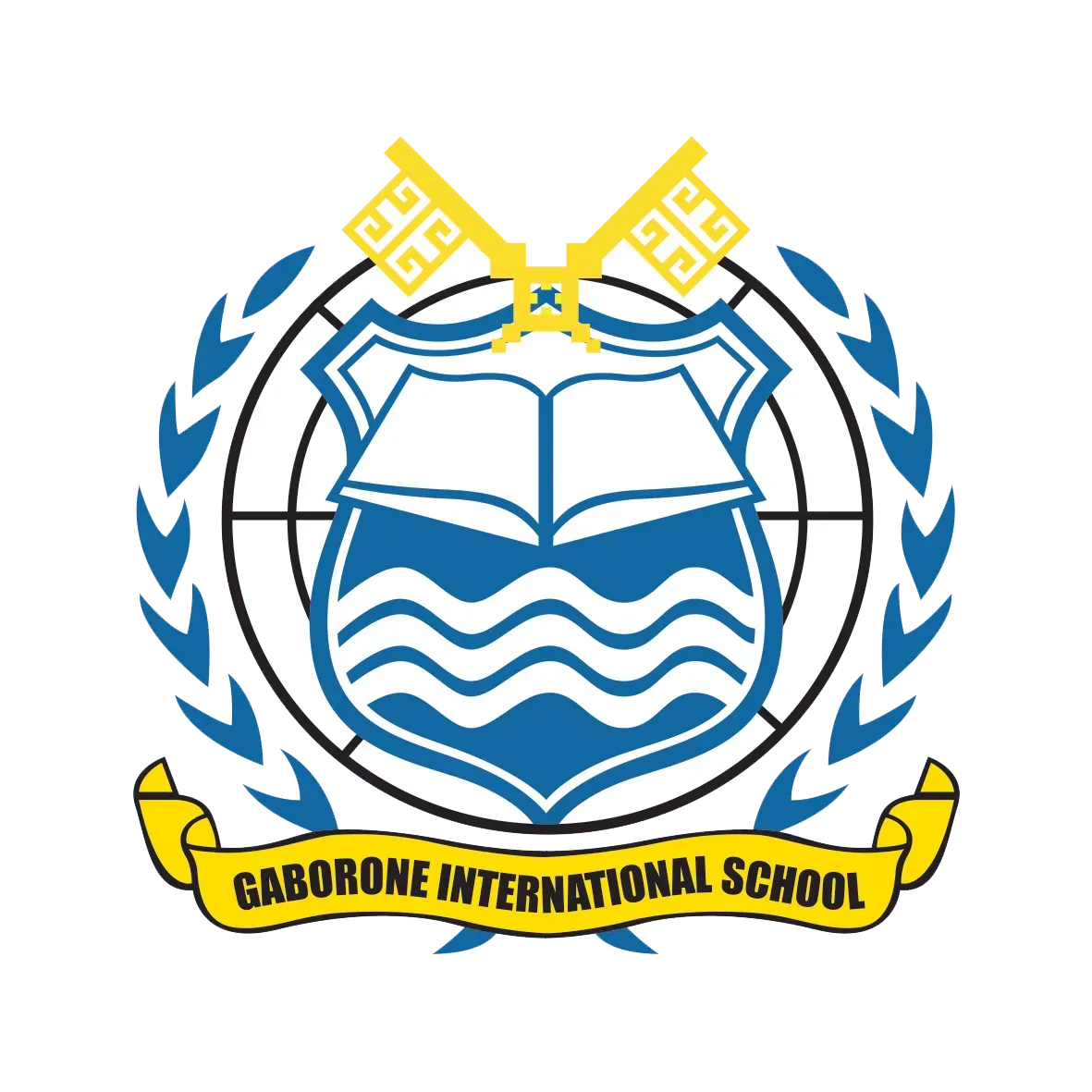GIS Soccer ACE!
May 19, 2021

Women’s football continues to grow in popularity around the world, and Gaborone International School (GIS) is proud to announce that their very own fourteen-year-old Palesa Mokopakgosi was recently chosen for the u/17 National Woman Squad.
She said that she was amazed and extremely excited to be given the opportunity to play with this very talented team. “I’m grateful to be selected out of many girls for this exciting opportunity”, she expressed. She continued to say that she felt very honoured that the coach saw something in her skill and talent to allow her to be part of this dynamic and talented group of payers.
Palesa believes in hard work and embraces the life skills soccer teaches her. She believes that there is a synergy on and off the field. “Soccer teaches not only teamwork, perseverance, and decision making, that I’ll be able to apply to all aspects of my life, but also helps me to learn to weather the ups and downs of life, anticipate opportunities and how to work with my peers to solve different challenges on the field. Most of all, I appreciate how playing this game connects me with a variety of talented peers, who has a love for this sport”, she says.
Sport such as soccer is a powerful tool for engaging youngsters and by putting the focus on fun. When asked how Palesa got hooked to the sport she smiled and said: “soccer chose me”. She says that she enjoys all forms of sport. “I love to be active but the opportunity to be scouted by a soccer club and then chosen to take a larger step into this sporting code shows me that God had chosen this pathway for me and I’m really grateful.”
Palesa always shows a positive attitude when approaching a game. When preparing for a game she says that she knows that she has done the work to be physically prepared. “You need to put in the hours and practise your skills. The more you train the better your chances will be to transform your skills into talent that scouts will value for a national or international team. You will have to cultivate a growth mindset and acknowledge that there is always a skill or trend that you can learn to improve your game. Be prepared to adjust your goalpost and constantly strive to improve your skills and be prepared to learn from the best”.
Additionally, your physical training is just as important as your mental preparation. “I never go into a game thinking I am the best because I know that the people, I’m meeting on the field are probably just as good as I am or probably even better. Also, their skills will push me again to be a better player and you need a mindset that will prepare you for the ups and downs on the field. Being open-minded allows you to take criticism for what it is, a suggestion to help you improve your game. You can learn more when you listen to suggestions and discuss various options. Do not be defensive, stay positive and remember in an intense game when tempers flare, to always talk it out. If you enjoy the path of playing your favourite sport, the satisfaction will be enormous and the sacrifice will be worth it”, she exclaims.
Quick Firing Questions:
- Favourite Player : The G.O.A.T Lionel Messi
- Favourite Team : La Liga Santander is FC Barcelona and in English Premier League is Manchester United
- Who inspires me : My mom, because she taught me things that I never thought were possible to have experienced. As an African child she gave me opportunities that I only saw happen in the movies. She continuously tells me that she is proud to be my mother and looks up to me, which makes me feel loved and appreciated. She gives me strength in moments of dismay, she gives me hope that the bad things in the world can be changed and she inspires me to continue being the best I can be.
- Quote I live by : I always tell myself that I can do all things through Christ who strengthens me.
- A special thanks go to : My Mom and Dad, my two older brothers Marang and Phatsimo, and my entire extended family for believing in me. My friends in school and in the neighbourhood, the school head of sports Mrs Makuyana as well as all my teachers for their support, my coaches at UB Kicks and the National team Coaches for this amazing opportunity. A BIG THANKS!
GIS is extremely proud of Palesa and we wish her and the National team all the best for the season!

In today’s connected world, young people grow up in a digital society where learning, friendships, and entertainment all happen online. At GIS, we see this not only as a reality to manage, but as an opportunity to empower our learners. Digital citizenship education is about much more than keeping students safe, it is about equipping them to use technology ethically, confidently, and effectively so they can thrive in the digital age. Why Digital Citizenship Matters Every post, click, or share leaves a digital footprint. These footprints can shape a learner’s reputation, relationships, and even their future opportunities. At GIS, students are taught to manage their online presence responsibly and make ethical choices. Through ICT lessons and the use of integrated platforms such as Microsoft Teams, Stasy, MAP, and ADvLEARN , learners don’t just study the theory of online safety, they practise it every day. Each GIS student logs in with personalised accounts, develops strong digital ethics, and is discouraged from behaviours that could lead to cybercrime.

Selecting a school for your child is one of the most important decisions you’ll make as a parent. A good school nurtures not just academic growth, but also social, emotional, and moral development. A good school does not only allow parents to dream of possibilities for their children but also assist in making those dreams become realities! With so many options available, public and private, it’s essential to know what to look for in making this important decision. During your next visit to a prospective school for your precious child, put some consideration towards the following important aspects of a school: 1. A Strong Educational Foundation Check for a clear and balanced curriculum that emphasizes core subjects like reading, math, science, and the arts. Ask about teaching methods and how the school measures progress. Look for schools that promote critical thinking, problem-solving, and creativity. Reputable schools produce excellent results, annually. At GIS we use Guided Readers, a digital platform for Standard 1-3 which gauges the reading ability of individual students. We also use ADvLEARN in Standard 7, Form 1-4 which uses adaptive technology to give tailor-made mathematics exercises to meet students where they are at, building them up to where they should be and beyond! Our campus is equipped with seven ICT labs, five physics/chemistry labs and two robotics labs. Our teachers are all equipped with laptos, projectors and sound bars to bring the class to life! We also have drones, VR-headsets, lazar cutters and 3-D printers – equipping our students to gain valuable experiences, preparing them for the real world! 2. Dedicated and Qualified Staff Meet the teachers and staff. Are they approachable, qualified, and passionate about education? A supportive, well-trained teaching staff can make a huge difference in your child’s learning experience. At GIS, all our teachers are qualified with 25% of our staff holding post-graduate degrees i.e. Masters and Honours Degrees. Another 46% hold degrees i.e. B.A, BEd or BSc. with the remainder of 29% holding a teaching diploma or equivalent. Our teachers enjoy regular training opportunities through our internal training platform, Sirius. Our teachers are thus life-long learners themselves, passionate about education and best-practice. We care about our individual students’ wellbeing and remain in close contact with parents throughout their child’s educational journey with us. 3. Registration, Health and Safety It is imperative to select a school which is registered with the necessary authorities as an operating school. All schools are bound by specific health and safety regulations with proven steps taken to comply. GIS High School is registered with Cambridge. The Primary School is registered with the Ministry of Education for PSLE examinations at the end of Standard 7. Being part of ADvTECH means that the school is subjected to rigorous health and safety protocol with internal and external audits being carried out annually. 4. A Positive School Culture Tour the school to observe the environment. Are students engaged and respectful? Do teachers and administrators seem enthusiastic and caring? A positive, inclusive atmosphere contributes significantly to a child’s confidence and motivation. We are proud to share that GIS-students hail from 32 different countries. We truly celebrate our unique cultures and individual strengths. Even so, we are grounded in Botswana values, taking care of our community and environment. Have a look out for our community service projects and participation in environmental programmes often shared on social media. 4. Student Support and Enrichment Opportunities Look for a school that provides more than just academics—such as counselling services, extracurricular activities, clubs, sports, and arts programs. These contribute to a well-rounded education and help children discover their interests and talents. At GIS, we have an on-site psychologist who assist with academic support and counselling. We also have a dedicated Deputy Principal of Pastoral Care and Discipline, ensuring that students are guided through each phase while reaching their full potential. Students can select from a vast range of extra-mural activities including but not limited to soccer, netball, swimming, athletics, basketball, table tennis, spelling bee competitions, maths Olympiads, debate and moot court. 5. Parental Involvement Strong schools often welcome parent engagement. Whether through regular communication or active partnerships between home and school, it truly supports student success. At the end of every academic term, parents are invited to our campus to meet with their children’s teachers to discuss the term’s progress and results. Parents are also invited to termly Coffee with the Heads of Schools during which important updates are shared. Parents are always welcome to reach out to our teachers and school management to support where needed. Final Thoughts Choosing the right school is a deeply personal decision. Take your time to visit, ask questions, and trust your instincts. Remember: the best school is the one where your child feels safe, supported, and inspired to learn! Allow us to dream with you and assist your child to ascend to their aspirations! You are invited to visit our school and to meet our principals.

At GIS Pre-Primary we follow the Reggio Emilia approach, and we believe that learning flourishes through collaboration among educators, learners, and families. Our environment is designed to spark curiosity, creativity, and meaningful connections. Central to our philosophy is the idea that parents are not just supporters of education but active partners in the learning journey. 1 . Open Communication We prioritize clear and consistent communication. Each term begins with a newsletter outlining key calendar events, followed by timely WhatsApp reminders to keep families informed. Monthly class overviews help parents stay engaged with their child’s learning, identify areas needing support, and collaborate with teachers before new topics are introduced. 2. Meaningful Parent Engagement We actively invite parents into the classroom to observe and participate in hands-on learning experiences. Celebrations like Father’s Day and Mother’s Day are honored, while events such as Sports Day offer opportunities for parents to join in the fun. When children see their parents involved, it reinforces a sense of encouragement and shared purpose, sending a powerful message that their education is deeply valued. 3 . Supporting Home Learning Learning does not stop at the school gate. Through weekend projects and real-world experiences, like gardening, baking, or museum visits, parents help children explore their world. Learners document these moments through photos and videos, fostering reflection, independence, and self-motivation. Watching themselves and their peers engaged in discovery empowers children to take ownership of their growth. 4. Celebrating an Inclusive Community At GIS, we proudly celebrate the diversity of our school community by hosting a range of events at varied times, ensuring that everyone can participate and feel included. Our Family Fun Day is a vibrant example of this, bringing together families from all walks of life to share in the rich cultural heritage, diverse experiences, and unique perspectives that make our school so special. These events not only foster a sense of belonging and connection among families but also create a warm and inclusive environment that welcomes and values every individual. Strong parent–teacher partnerships are the foundation of a thriving learning environment. At GIS, we’re committed to nurturing these connections, ensuring that every child is supported, inspired, and surrounded by a community that believes in their potential.
